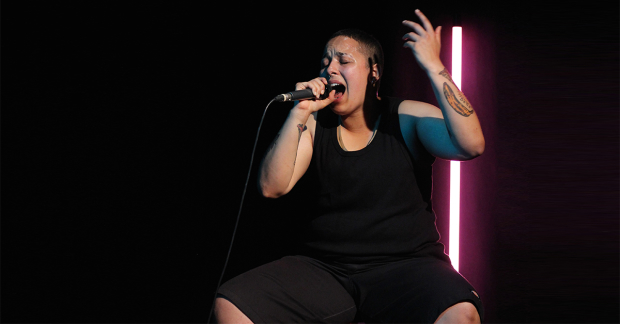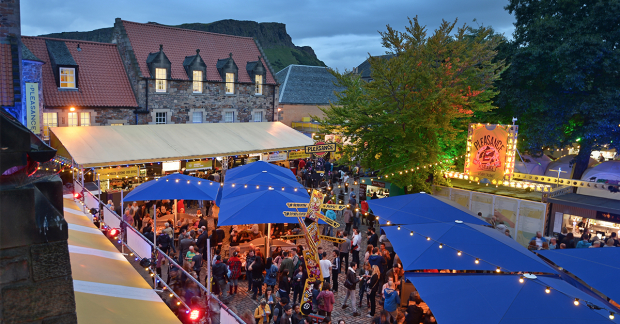The future of theatre: what can artists expect when venues re-open?

© Max Zadeh
No one knows when exactly theatres will re-open, but we've asked some industry figures, all of whom, notably, made a large splash at last year's Edinburgh Fringe, to give their thoughts on what theatre may look like when things do begin to start up again.
Suba Das, artistic director of Hightide:
"As the past few weeks have unfolded, it's become increasingly clear that the question is what will happen "if" not "when" the theatres re-open. In the absence of sector-specific intervention from the Government, despite culture being at the heart of the UK's global reputation and returning to Treasury much, much more income than state investment; we already see theatre venues posting redundancy notices.
"Of course such venues may rapidly re-open and re-recruit once social distancing guidelines pass; and there is no doubt at all for me that audiences will come – if the sight of illegal VE Day gatherings and beach trips shows us anything, it's that we're inherently social animals and we thrive on shared physical experiences.
But who will we lose from the sector during any unsupported interruption? Who may not find their way back, if they quite practically need to seek other work to pay their bills while the doors are closed? My fear is that we're heading for an even more elitist sector. And that means a sector without the Shakespeare's, the Becketts and the John Osbornes.
"Thinking to HighTide's own proud history; it could mean a sector without the Jack Thornes, Vinay Patels and Theresa Ikokos. As a company without the burden of a costly, empty building, we're doing everything we can at the moment to protect and support as many diverse voices as possible, and we're excited that the constraints we now face mean that we have permission to be more creative than ever before; imagining how stories can exist as installation; as immersive experience; as podcast; as online offering.
"But the economics of such new models remain unclear; and ensuring our brilliant artists can earn a proper living from what they do, is what needs the most urgent investigation."
'Theatre institutions should be using this time to think about how they are working to dismantle old structures'
Char and Yaz, The Queer House
"Acknowledging the current movement that is calling out the rampant levels of systemic racism existing within the arts sector, it is really difficult to get behind the re-opening of theatres as they currently function. It's clear that theatre institutions should be using this time to think about how they are working to dismantle old structures, a metaphorical burning down and rebuilding.
"In 2019, Jemma Desai, a programmer and writer, published The arts are in the Sunken Place – how do we Get Out?, she writes: 'The sector is not in fact in a moment of self-inquiry and redress but actually performing a monumental act of dissonance, upholding the same power structures it always has…'"
There are lots of conversations about getting audiences back, but what about the audiences that were never really there?
"If this moment has shown us anything it is that diversity initiatives just don't cut it. There are lots of conversations about getting audiences back, but what about the audiences that were never really there? We're assuming that theatre reached everyone it should have. It didn't. The White Pube pose some really great questions in their piece ideas for a new art world – how useful is the work we make and how useful are the buildings themselves as civic spaces? It isn't a question of returning for our community or for many other marginalised groups.
|Our associate colleague and designer Rosie Elnile spoke once about how in this moment where a lot of things seem impossible, maybe anything is possible. We carry this sentiment with us and when it feels like there is no hope, we reach for it."
Anthony Alderson, Director, The Pleasance Theatre Trust
"Audiences will be extremely tentative – when theatres reopen, there is the potential for a very slow response in the first three to six months. Tragically, until we have the all clear, some people may never return. In bigger cities, I believe we may well see the return of audiences faster than rural venues. In large cities, people are used to living in each other's pockets cheek by Jowl and won't be so nervous about congregating again, but it will be gradual.

© Neil Hanna
"Younger audiences may well return to the theatres faster and theatres catering for these audiences could benefit. Comedy will be a vital part of that. There will still be a huge appetite for theatre – the allure of live performance is tantalising, not having it for these last few months, only demonstrates how vital it is.
"We need to be transported somewhere different through great actors, great comedy and great writing. There will be great new plays and bright new comedians developing brilliant work during this time. Now it is online that it is starting to emerge and over the next few months I think we will see more and more.
"The lockdown has been devastating to our industry. Without support theatres across the country will close. We'll need people's support more than ever – laughter and joy are just as contagious. So please in the meantime support your local theatre, you'll be glad you did when you can return. "










